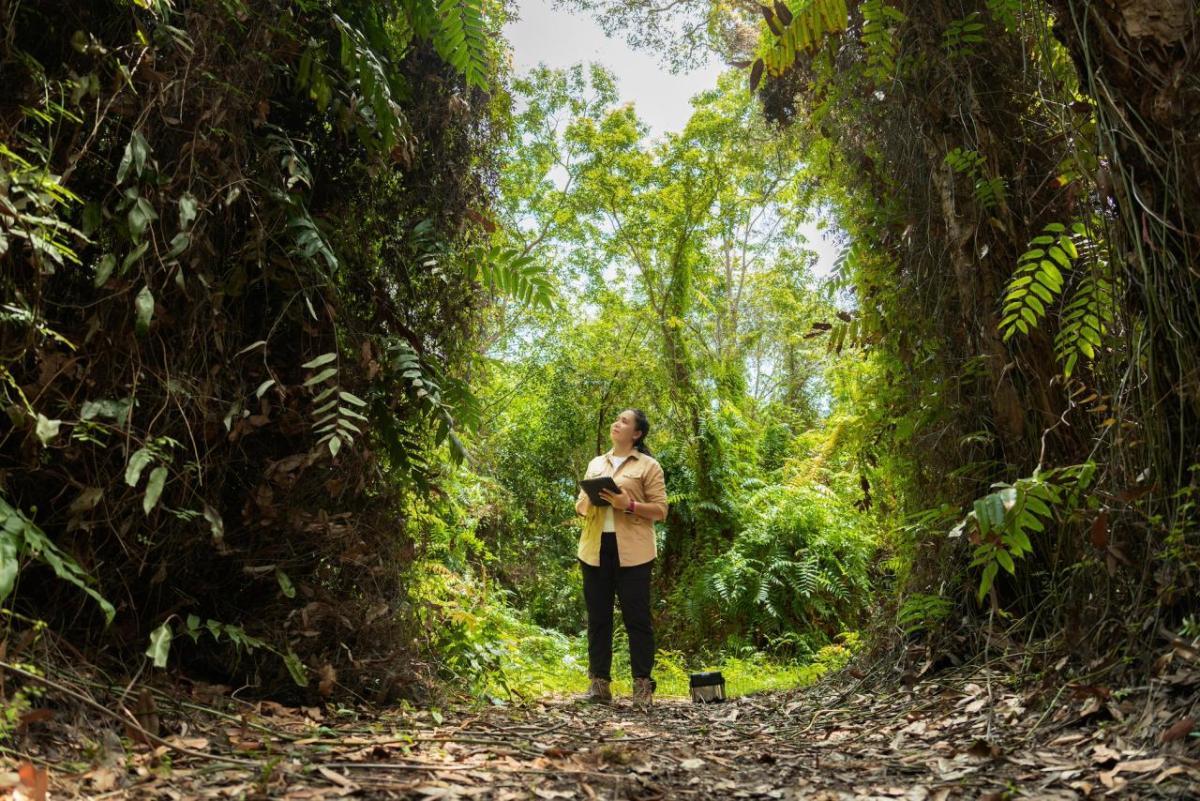
Celebrating Women's Inclusion In The Climate Innovation Space
The theme for IWD this year is“inspire inclusion.” Thriving economies depend on stable environments and inclusive societies, and that's why Cisco's environmental sustainability strategy, The Plan for Possible , includes investing in resilient ecosystems as one of its three priorities. It is in our shared interest to help humans and nature navigate a changing climate by investing in regenerative technologies, workforces, and nature itself. The Cisco Foundation's Climate Grants and Investments team is working toward that vision by providing nonprofit grants and impact investing to support innovative climate solutions.
As I reflected in a piece last year about women making strides in sustainability , I couldn't be prouder to see so many women represented in the environmental sustainability space. Women couldn't be better positioned to help connect us to a more regenerative future. According to United Nations (UN) Women ,“In general, women are more likely to consider their families and communities in decision-making processes-which is crucial to producing the kind of holistic solutions that make for effective climate action.”
To gain some different perspectives, we asked six women entrepreneurs, whose climate technologies the Cisco Foundation has invested in, how women's leadership and creativity in the climate innovation space helps us build resilient ecosystems. This is what they had to say:
Allison Wolff, CEO, Vibrant Planet - United States
“Jane Goodall, one of the women I most admire, said: 'The environment, after all, is where we all meet, where we all have a mutual interest. It is one thing that all of us share. It is not only a mirror of ourselves, but a focusing lens on what we can become.'
I am inspired by many women in the nature solutions space. Margo Robbins is a Karuk Tribal member teaching hundreds of people the art of beneficial fire; Katharine Hayhoe leads science at The Nature Conservancy; Sandra Steingraber who picked up Rachel Carson's lifesaving work; dozens of women cofounders and CEOs who, like me, are pioneering the nature tech space.
Perhaps women are leading this space because we naturally have a nurturing, reciprocal relationship with nature rather than a destructive one. Women are known for creating community and we know that the answer to the nature and climate crisis resides in community, collaboration, and cooperation. Women know that nature is community and community is nature.”
Ugwem I. Eneyo, CEO and Co-Founder, SHYFT Power Solutions - Nigeria
“As the founder and CEO of SHYFT Power Solutions, I've had the opportunity to work with families, businesses, regulatory bodies, and a wide range of stakeholders, delivering technology and solutions to solve some of Africa's toughest energy challenges.
I see how economies can be impacted and ultimately thrive when we take creative approaches to supporting clean, reliable, and affordable energy solutions.
I believe people closest to challenges are often in a unique and promising position to solve those challenges, and solving climate and environmental challenges can be best achieved when women are involved and leading those efforts.
One of SHYFT's core values is solving unique challenges with diverse perspectives, and the creativity, ingenuity, and insight of women are a key part of that.”
Emily Jacobi, Founder and Co-Director, Digital Democracy - United States
“I believe that women's full participation and leadership in general is critical to a thriving human ecosystem. This is particularly true in the climate innovation space.
Through my work with Digital Democracy, I have been privileged to work with Indigenous women on four different continents and I have seen firsthand how much more effective and resilient climate work is when women's contributions are fully valued and recognized in their communities.
Everywhere we've worked, I've seen how Indigenous women bring essential skills, knowledge, and energy to the collective work of building resilience. For example, in so many Indigenous communities in the Americas, it is women who are the knowledge keepers of where sacred medicinal plants are grown, and how to best tend to traditional foods – essential knowledge for climate resilience. Or with our close partners the Cheptikale Ogiek of Mt Elgon, Kenya, women have played a leading role in a mapping initiative to restore ancestral lands to their communities, helping to protect and steward their local ecosystem.
The future of humanity depends on us doing everything we can to support resilient ecosystems in the world at large, and therefore depends on women's inclusion in these efforts.”
Nancy Schellhorn, Co-Founder and CEO, RapidAIM - Australia
“As women leaders, we bring visibility to the value of whole-of-community approaches to innovation.
Meeting the challenge of building resilient ecosystems takes all of us. It is our diversity of thinking and lived experience that helps us fully understand the problems that we need to solve, and that guides our creativity in developing solutions.
At the company I lead, RapidAIM, we're on a mission to reduce the chemical intensity of agriculture. Pesticides are hydrocarbons that have been a mainstay of protecting food and fiber systems for decades. They have brought value by providing simple solutions to protecting crops, but also CO2e and harm to biodiversity.
At RapidAIM we believe in protecting crops while also protecting people and the planet. We achieve this with our cutting-edge hardware-enabled pest detection and defense system. Our novel internet of Things (IoT) insect sensors connects growers to the farm 24/7 to enable the most precise management of pests.
In celebration of International Women's Day, let's honour those women who have cleared the path of innovation by being bold, believing in our vision, and building for a better future.”
Kelly Erhart, President and Co-Founder, Vesta - United States
“Ideal leadership includes varying perspectives and reflects the population being led. So, naturally, including women's perspectives at senior levels is essential to holistic leadership for any organization – and the climate innovation space is no different.
In my personal experience, the teams where I've seen the most success are those that include women at the helm. Most recently, at Vesta, I helped build an organization that includes women in leadership positions in both the business and science functions – and we've been able to develop one of the most cost-effective emerging climate technologies available today as a result.
When I work alongside the women at Vesta, I don't just feel optimistic, I feel inspired. Every day they're doing something that's helping a cause bigger than themselves, bigger than all of us. And this goes beyond Vesta as well: we see female leadership helping activate climate progress globally. As the UN reported, 'In the workplace, women's leadership is associated with increased transparency around climate impact. Higher percentages of women on corporate boards positively correlates with the disclosure of carbon emissions information.' For our planet to make progress towards the goals we've set out as a society, it's clear that we need all voices and genders at the table doing their part.
I truthfully can't think of a better group of people to conduct our work on ocean-based carbon removal than the incredible women we have at Vesta. I'm beyond thankful to be able to work alongside such passionate and capable women who strive to make the world a cooler place.”
Nicole Rycroft, Founder and Executive Director, Canopy - Canada
“International Women's Day focuses our attention on the things we now take for granted that were once monumental struggles of courage. It's also a time to take note of entrenched systems that continue to threaten women's peace of mind and body. My NGO, Canopy, being woman-led and with a formidable team that is 85% women, stands on the shoulders of women who have taken on the seemingly impossible and won. We are keenly aware that women are disproportionately impacted by climate change – and historically under-represented in the decisions that have created the ecological mess we're in.
The climate crisis requires all-hands on deck. But until significantly more women are in decision-making positions – we've tied one hand behind our back as Spaceship Earth falters.
Stabilizing our climate requires solutions to be scaled on accelerated timelines. It requires a comfort with ambiguity along with fierceness and determination (beware of mama bears). No single country, company or organization can solve the climate crisis by themselves. Leaders that value traits of collaboration as much or more than beating the competition will feel more comfortable in this existential endeavor. As U.S. President Harry Truman remarked, 'It is amazing what you can accomplish if you do not care who gets the credit.'
In my work alongside women in investment, business, civil society, and philanthropy, I see these traits deployed daily. Women lifting the work of others, creating pre-competitive solutions-spaces for the common goal. Through persistent and strategic efforts, we are shifting entrenched economic and political dynamics, transforming unsustainable supply chains, and securing ambitious, community-led conservation. Today, we honor these achievements and dare to dream bigger.”
See how Canopy is transforming supply chains above.
Fostering resiliency, empowering people, protecting the planet. Learn more about Cisco Foundation's Climate Grants and Investments
View original content here.

Legal Disclaimer:
MENAFN provides the
information “as is” without warranty of any kind. We do not accept
any responsibility or liability for the accuracy, content, images,
videos, licenses, completeness, legality, or reliability of the information
contained in this article. If you have any complaints or copyright
issues related to this article, kindly contact the provider above.


















Comments
No comment